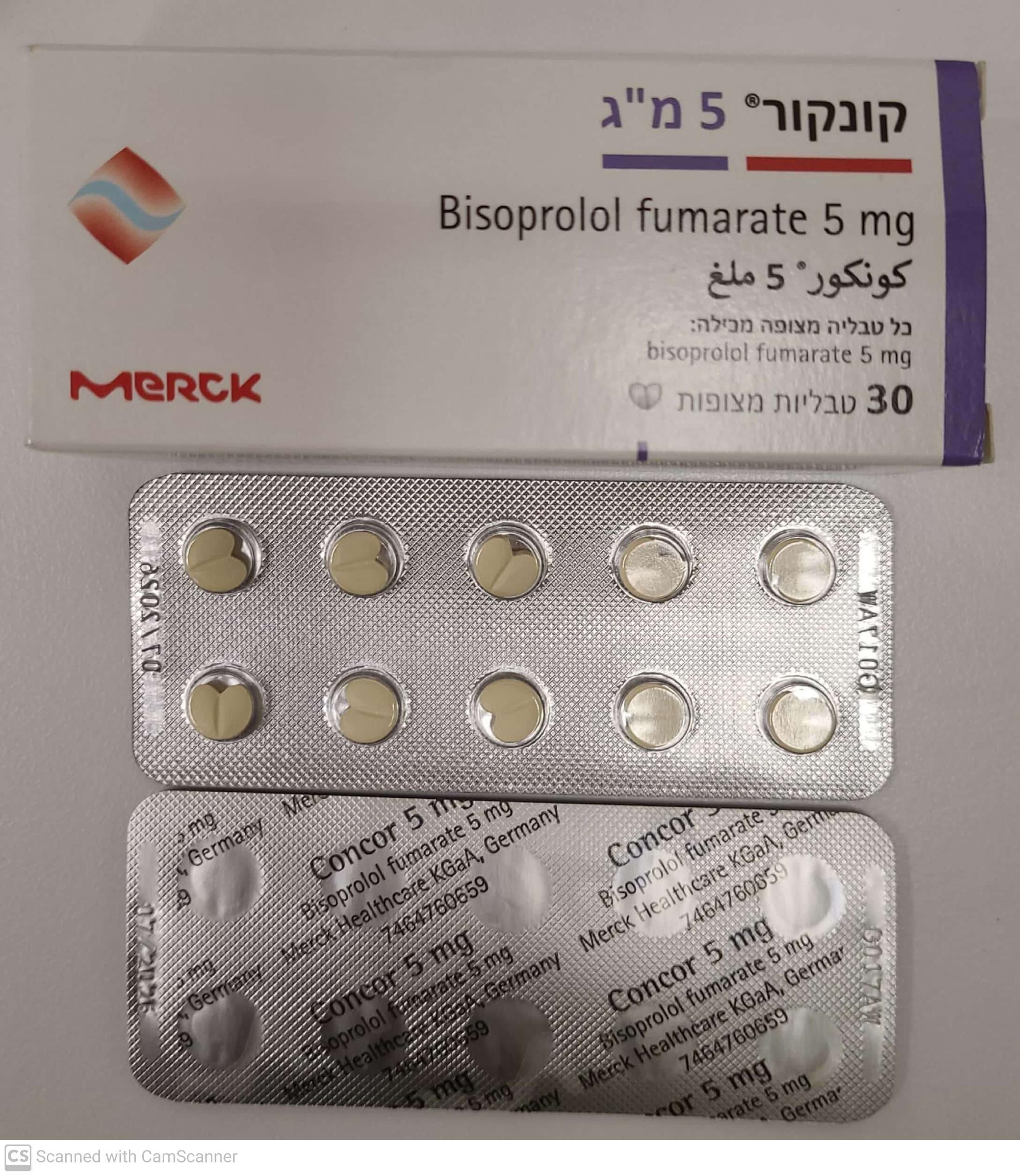Quest for the right Drug

קונקור 5 מ"ג CONCOR 5 MG (BISOPROLOL FUMARATE)
תרופה במרשם
תרופה בסל
נרקוטיקה
ציטוטוקסיקה
צורת מתן:
פומי : PER OS
צורת מינון:
טבליה : TABLETS
עלון לרופא
מינוניםPosology התוויות
Indications תופעות לוואי
Adverse reactions התוויות נגד
Contraindications אינטראקציות
Interactions מינון יתר
Overdose הריון/הנקה
Pregnancy & Lactation אוכלוסיות מיוחדות
Special populations תכונות פרמקולוגיות
Pharmacological properties מידע רוקחי
Pharmaceutical particulars אזהרת שימוש
Special Warning עלון לרופא
Physicians Leaflet
Posology : מינונים
4.2 Posology and method of administration Chronic Heart Failure Standard treatment of CHF consists of an ACE inhibitor (or an angiotensin receptor blocker in case of intolerance to ACE inhibitors), a beta-blocker, diuretics, and when appropriate cardiac glycosides. Patients should be stable (without acute failure) when bisoprolol treatment is initiated. It is recommended that the treating physician should be experienced in the management of chronic heart failure. Transient worsening of heart failure, hypotension, or bradycardia may occur during the titration period and thereafter. Posology Titration phase The treatment of stable chronic heart failure with bisoprolol requires a titration phase. The treatment with bisoprolol is to be started with a gradual uptitration according to the following steps: • 1.25 mg once daily for 1 week, if well tolerated increase to • 2.5 mg once daily for a further week, if well tolerated increase to • 3.75 mg once daily for a further week, if well tolerated increase to • 5 mg once daily for the 4 following weeks, if well tolerated increase to • 7.5 mg once daily for the 4 following weeks, if well tolerated increase to • 10 mg once daily for the maintenance therapy. The maximum recommended dose is 10 mg once daily. Close monitoring of vital signs (heart rate, blood pressure) and symptoms of worsening heart failure is recommended during the titration phase. Symptoms may already occur within the first day after initiating the therapy. Treatment modification If the maximum recommended dose is not well tolerated, gradual dose reduction may be considered. In case of transient worsening of heart failure, hypotension, or bradycardia reconsideration of the dosage of the concomitant medication is recommended. It may also be necessary to temporarily lower the dose of bisoprolol or to consider discontinuation. The reintroduction and/or uptitration of bisoprolol should always be considered when the patient becomes stable again. If discontinuation is considered, gradual dose decrease is recommended, since abrupt withdrawal may lead to acute deterioration of the patient's condition. Treatment of stable chronic heart failure with bisoprolol is generally a long-term treatment. Patients with hepatic or renal impairment There is no information regarding pharmacokinetics of bisoprolol in patients with chronic heart failure and with impaired hepatic or renal function. Uptitration of the dose in these populations should therefore be made with additional caution. Hypertension and Coronary heart disease (angina pectoris) Posology Treatment should principally be initiated gradually with low doses, which are then increased slowly. In all cases the dosage should be adjusted individually, in particular according to the pulse rate and therapeutic success. Hypertension The recommended dosage is 5 mg bisoprolol fumarate once daily. In milder forms of hypertension (diastolic blood pressure up to 105 mmHg) therapy with 2.5 mg once daily may be adequate. If necessary, the dosage may be increased to 10 mg once daily. Any further increase of dosage is justified only in exceptional cases. The maximum recommended dosage is 20 mg once daily. Coronary heart disease (angina pectoris) The recommended dosage is 5 mg bisoprolol fumarate once daily. If necessary, the dosage may be increased to 10 mg once daily. Any further increase of dosage is justified only in exceptional cases. The maximum recommended dosage is 20 mg once daily. The duration of treatment is not limited. It depends upon the nature and severity of the disease. Dosage in hepatic and/or renal insufficiency In patients with liver or kidney function disorders of mild to moderate severity no dosage adjustment is normally required. In patients with severe kidney function disorders (creatinine clearance < 20 ml/min) and in patients with severely impaired liver function a daily dose of 10 mg bisoprolol fumarate should not be exceeded. There is only limited experience with the use of bisoprolol in dialysis patients. There are no indications of the necessity to alter the dose regimen. Older people No dose adjustment is required. Paediatric population There is no paediatric experience with bisoprolol, therefore its use cannot be recommended in paediatric patients. Method of administration Bisoprolol tablets should be taken in the morning and can be taken with food. They should be swallowed with liquid. There is no information about chewing or crushing the tablets. The scored tablets can be divided into two equal doses.

שימוש לפי פנקס קופ''ח כללית 1994
לא צוין
תאריך הכללה מקורי בסל
לא צוין
הגבלות
לא צוין
מידע נוסף
